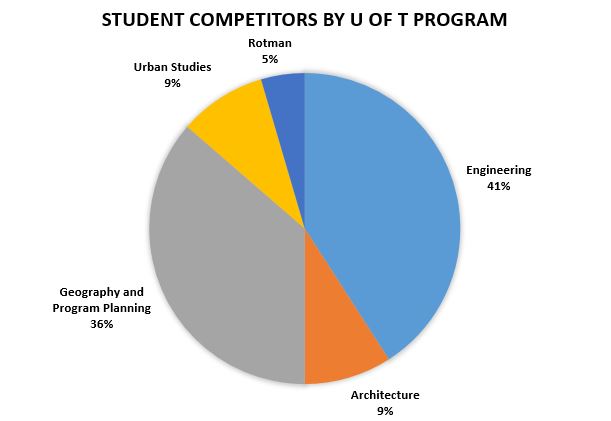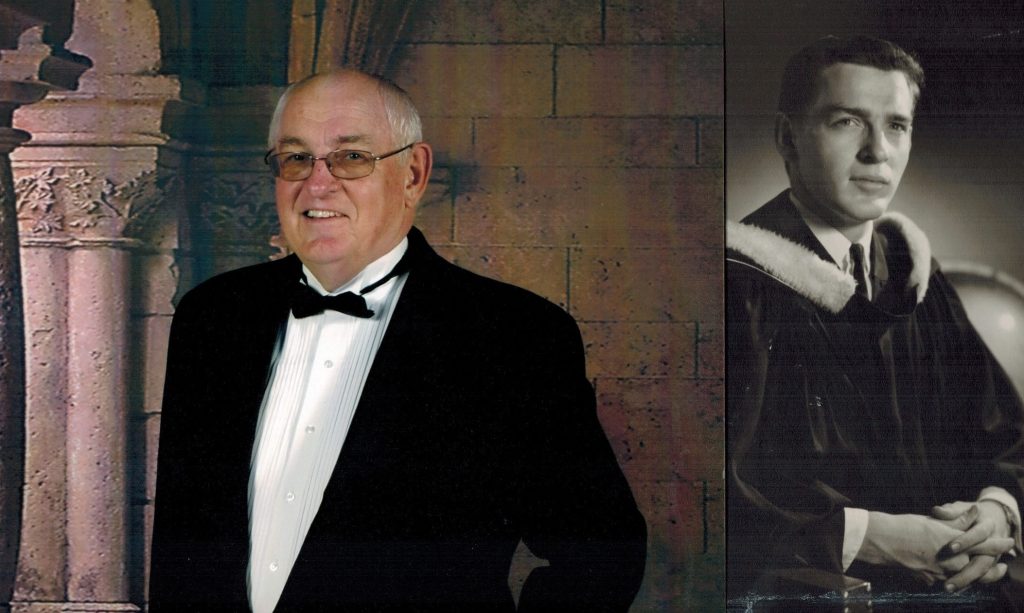
When engineers talk about bridge plans, it usually conjures up visions of infrastructure; Brian Gray (CivE 6T8, MEng 7T1), however, has game plans in mind.
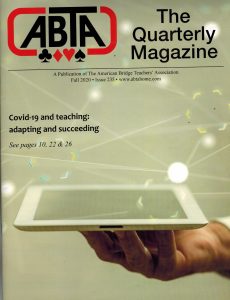
As an advancing beginner to the duplicate bridge-playing community, Gray has authored columns and a book, with a recently penned a column published in the fall 2020 edition of the bridge publication American Bridge Teachers’ Association The Quarterly Magazine. Appropriately, it’s a pandemic-themed article titled “The Safety Play“advising readers to stay home.
Linking the ethics of practicing engineering to card playing, Gray stresses “The ethics in engineering is just like the ethics in bridge. With bridge you have a convention card of all the agreements you have with your partner on how you’re going to bid. But you cannot have anything secret.” There must be full disclosure.
“Ethics and engineering. Sometimes you have to tell a client like a good friend what he needs to hear. We at Peto McCallum do a lot of work for conditional offer to purchase properties. We do soil tests, and the client may love the property, they’ve done the market study; this is the site for our building. But sometimes you have to tell them there’s a high water table. You want three levels of underground parking, there will be costly dewatering and permanent waterproof membrane design requirements.”
“Peto also does investigations. Occasionally, after property registry search, field soil sampling and chemical testing, we have to be the bearers of bad news,” Gray continues. “The site was an old BP (British Petroleum) gas station in the 50s. That’s why it’s available. So, when you’re doing that type of work, where the results of the report will determine the feasibility of the project. You really do need to call a spade a spade and not a ‘good news’ report.”
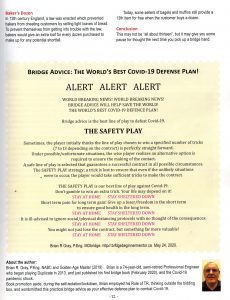
Gray was introduced to the card game of bridge as a youth, when his parents would host social parties. “Saturday night there were suddenly tables put out and bowls of treats, I like nuts,” he recalls. He also admits to missing a class or two playing bridge at the Galbraith third floor common room.
Dabbling with the game over the years, he found the game of duplicate bridge as a calling and started playing in 2012.
Gray saw beginners struggling and that there was a missing link for newcomers to leave the comfort of the classroom to transition confidently and successfully to the clubroom environment.
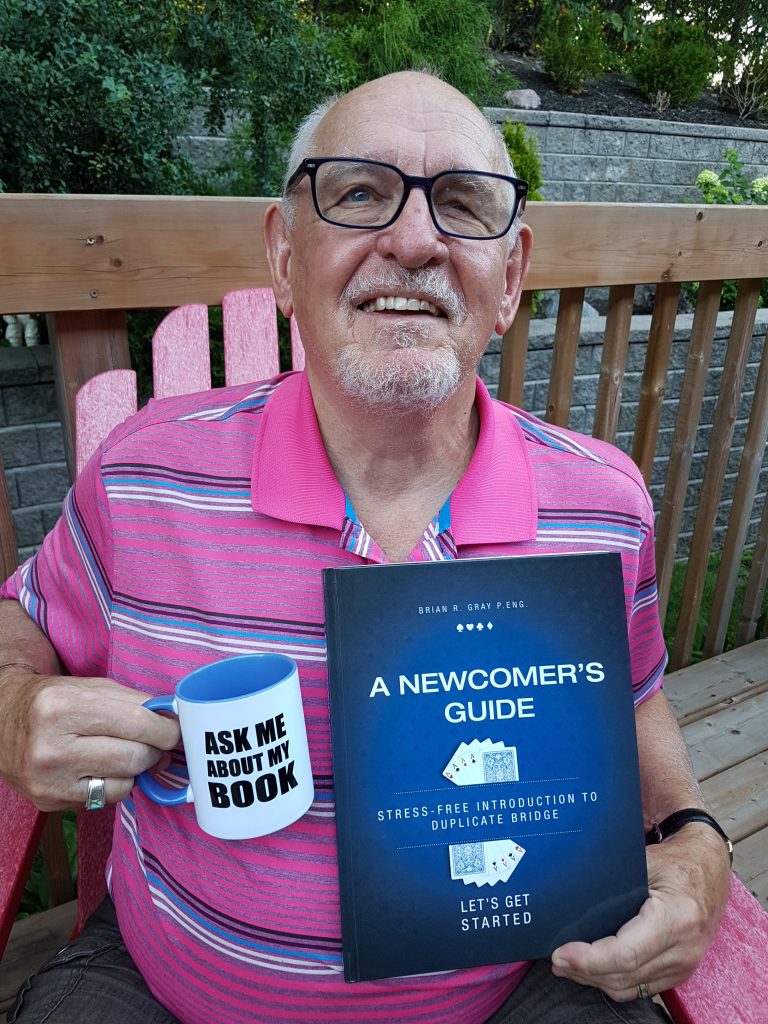
The result is A Newcomer’s Guide: Stress-Free Introduction to Duplicate Bridge, published February 18, 2020.
John Rayner, Canadian Pairs Champion and member of the Canadian Bridge Hall of Fame wrote “Brian’s book should be a ‘must-read’ for every newer player and for more experienced players as well– you have done bridge players a great service with your guide.”
Duplicate bridge is widely used in club and tournament play. The game is called duplicate, as competing pairs play the same cards with the same Dealer and Vulnerability, with scoring based on relative performance. Essentially, every hand is played in competition with others playing identical cards. “The cards are in a plastic board, and it sits on the table. You play the cards with the four people at the table. When you’re finished you put them in the board, and it gets passed on to another table,” explains Gray. “The interesting part about duplicate bridge is it’s the scoring system, but it’s basically the same game everyone plays.”
The publicity tour for the book never had a chance to get underway. Visits to several clubs and tournaments had been mapped out, but the pandemic intervened and no in-person gatherings were to be held. Gray, then wintering in Scottsdale, AZ and close to many bridge clubs, was able to return to Canada and his home in Mississauga, Ont.
Though initially easing into semi-retirement in 2011, Gray has stayed working in engineering as a Principal Consultant at Peto MacCallum. “Where would you find somebody with 42 years experience in geotechnical engineering? I have a love of doing foundation investigations for bridges and now my new love has been duplicate bridge,” Gray reflects on his dual loves.
After completing his MEng at U of T Gray worked with Golder Associates, a geotechnical firm, for five-and-a-half years, then with Peto MacCallum for 45 years. “I was the president of Peto MacCallum from 2000 to 2003 and on the board from 1987 to 2010,”
“Of note, 2020 was a great year for me – 50 years as an engineer. I published my first bridge book and 45 years at Peto in June, ” recalls Gray.
Gray’s ability to keep accurate track of his work has transcended into his play. “I’m an engineer, I keep records. When you’re doing work, you monitor – things like settlement of buildings, you do assessment of performance of structures by taking data. I keep track of the number of games – I played 885 games to date and know who was my partner – I’ve had over 100 partners.”
As a parting reminder he quips, “Engineering and Bridge are linked acknowledging the importance of Ethics, Mentoring and Continued Learning. Bridge keeps the grey cells working; it’s a mental mind game sport!”
By Phill Snel

Majed Karam (CivE MASc 2T0) won first place at the American Concrete Institute’s poster competition with Assessing the Differential Fluid-Penetration Resistance in the Concrete Cover Through Formation Factor Mapping. Karam presented his poster during the ACI 123 Concrete Research Poster Session at the Fall 2020 ACI Virtual Convention.
Currently, Karam is working in Dubai, United Arab Emirates as Concrete materials & NDT engineer at e.construct.
Here is some info regarding the poster:
 Event: American Concrete Institute Fall Convention
Event: American Concrete Institute Fall Convention- Session: Research in Progress (a session where research in progress is presented, not a formal competition)
- Link to the ACI website with the virtual “award ceremony”: https://concrete.org/news/newsdetail.aspx?f=51729362
- Goal of research work: There is a lack of rapid test methods for accurately assessing the impact of curing on the differential hydration through the depth of the concrete cover as well as the impact on chloride penetration resistance. In the absence of adequate performance assessment tools, prescriptive curing specifications have been adopted for concretes exposed to chlorides and other exposures. There is a desire to switch to a performance specification for curing, particularly by the precast concrete industry, that could be used to assess the impact of using of accelerated heat curing methods widely used to obtain high early-strength gain and maturity. The work presented presents an electrical-impedance-based approach forquantifying curing effects in the concrete cover. The analytical formulations and experimental validations lay the ground for a potential real-time concrete production optimization tool.
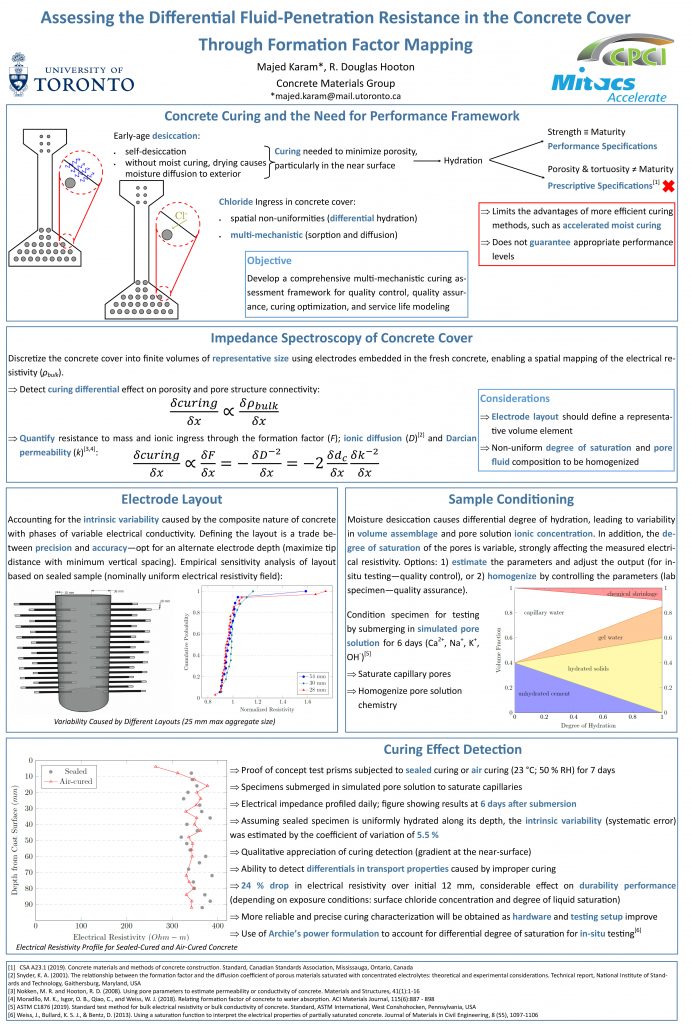
U of T’s fall convocation ceremony 2020 was presented virtually on Saturday, November 21, 2020 at noon. The event itself saw 75 CivMin students honoured.
Here’s the breakdown:
- 5 CivE BASc
- 38 MEng
- 1 MEng CEM
- 24 MASc
- 7 PhD
Congratulations to all of our graduates!
~ CivMin
November 22, 2020 | The Globe and Mail
As the COVID-19 pandemic raised awareness of inequities and challenges in transportation, the U of T Transportation Alumni Committee recognized a unique opportunity to focus their annual New Frontiers in Transportation student research competition on timely, relevant issues. They chose for this year’s theme “Transportation Network Resilience in the Age of COVID-19 and Beyond.”
CivMin representation
Engineering students were well represented, as 41 per cent of total participants. The Department of Civil & Mineral Engineering (CivMin) saw a fantastic turnout within the winners, with four Civil Engineering (CivE) undergraduate and graduate students, and another four Master of Engineering, Cities and Engineering Management (MEng CEM) students.
Results of the student teams’ research projects under this theme were presented at a public online symposium on November 12, 2020.
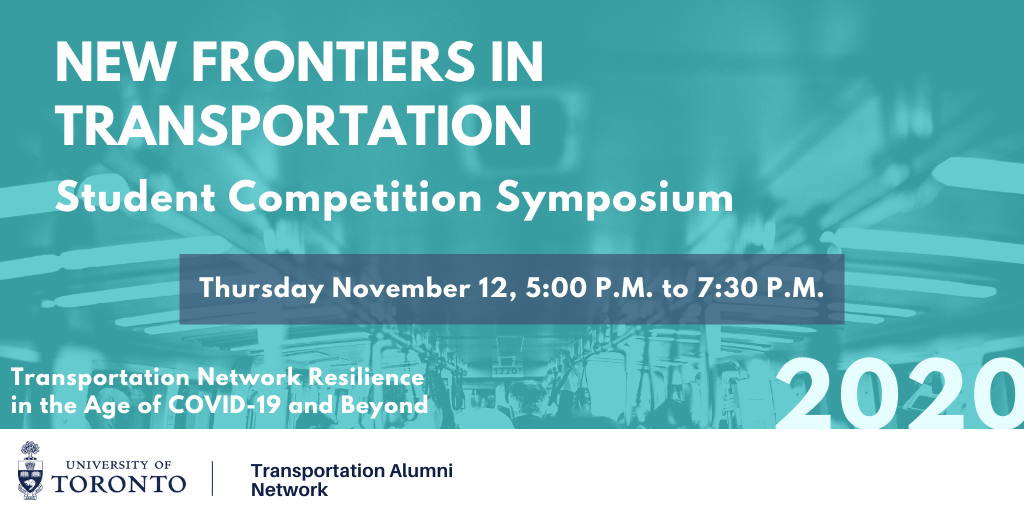
The competition
The student competition symposium was the final stage of a process that began with a virtual launch event on June 9. Student team proposals on the topic “Transportation Network Resilience in the Age of COVID-19 and Beyond” were submitted later in June, and from those, short-listed teams were chosen and assigned mentors.
The student teams worked with mentors over a four-month period and submitted final reports mid-October.
Finally, at the symposium on November 12, twenty-two University of Toronto students in six interdisciplinary teams presented their research projects to a panel of judges in front of a live audience of over 90 attendees over Zoom. Following high-level presentations of ten minutes, each team responded to Q & A.
Interdisciplinary collaboration key
Competitors ranged from 2nd year undergraduate students to recent Master’s program graduates. Teams consisted of three or four students and were required to have participants from at least two different U of T departments. The resulting teams included students from a variety of programs of study including Commerce/Rotman, Urban Studies, Engineering, Architecture, and Geography and Planning. Several of the students’ programs include majors and minors spanning Political Science, Economics, Anthropology, Russian Literature, Environment, and Peace, Conflict and Justice.
A breakdown of programs of study for the 22 competitors at the New Frontiers in Transportation Student Competition Symposium November 12, 2020. There was an even split between graduate and undergraduate students, some of whom were 2020 graduates.
Mentors
Each student team worked on their research project and competition presentation with oversight from two volunteer mentors from the transportation profession. Twelve mentors participated:
- Onkar Chander, Specialist, Operations Excellence, Purolator
- Raphael Dumas, Project lead at City of Toronto Big Data Innovation
- Antonio Gittens, Transportation Planner, IBI Group
- Heidi Herget, Principal Transport Consultant, Move Consultants
- San Kassiedass, On Demand Transit Expert
- Ben Loucks, Highways and Roads Business Class Lead, HDR
- Loui Pappas, Vice President, Business Development, Transportation, Morrison Hershfield
- Matt Pinder, Transportation Engineer, Alta Planning
- Malvika Rudra, Head of Corridor Management, Ministry of Transportation
- Shahan Shaikh, Communications System Designer, Toronto Transit Commission
- Katie Wittman, Transportation Service, City of Toronto
- Patrick Yip, Transportation Engineer, HDR
Judging
Teams were scored based on their overall idea, research methods, written paper and presentation.
The judging team consisted of Michelle Berquist of City of Toronto, David Forsey of IBI Group and Tyrone Gan, Senior Vice President at HDR Corporation. Following the presentations, the judges met privately before returning to the event to announce the results.
Michelle Berquist acted as spokesperson for the judging team. In her remarks, she noted the high level of work demonstrated by all teams, saying:
“It’s very hard to judge these kind of competitions. The quality across the board is incredible … so much work and so much thought into very different projects, so they’re they’re hard to compare because they’re all great and because they’re all different. Everyone has achieved a lot tonight.”
Prize winning student team presentations
 First place of $550 per student: “Adapting Bikeshare Toronto to meet transportation needs in a COVID-19 era”
First place of $550 per student: “Adapting Bikeshare Toronto to meet transportation needs in a COVID-19 era”
Team members:
- Pooja Brahmbhatt (MUrbDes 2020), currently a proposal and marketing coordinator at Baird Sampson Neuert Architects
- Drishya Nair (MEngCEM 2020), currently a Research Associate at U of T
- Amy Protheroe (MScPl 2021)
Summary: This project seeks to increase transportation options and improve equity in access to Bike Share Toronto through investigating opportunities for network expansion and proposing options to address financial and structural barriers to use.
Mentors for this team were Matt Pinder, Transportation Engineer, Alta Planning and Katie Wittman, Transportation Services at the City of Toronto.
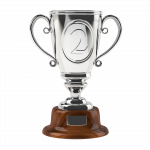 Second place of $450 per student: “Sense and scalability: Up scaling neighborhood solutions to city-wide problems”
Second place of $450 per student: “Sense and scalability: Up scaling neighborhood solutions to city-wide problems”
Team members:
- David de Paiva (BA 2021) Majors: Urban Studies, Political Science; Minor: Russian Literature
- Lewis Walker (BA 2021) Majors: Human Geography (focus in Planning), Urban Studies; Minor: Anthropology
- Bethany Wong (MScPl 2022)
- Michelle Zhang (HonsBA 2021) Urban Studies specialist; Major: Peace, Conflict and Justice; Minor: Human Geography
Summary: Our approach is centred on creating system resiliency by building community engagement. We propose a two-step solution: adapt to meet COVID-related challenges in the short-term, and construct a cross-jurisdictional framework to handle challenges in the long-term.
Mentors for this team were Raphael Dumas, Project lead at City of Toronto Big Data Innovation Team and Heidi Herget, Principal Transport Consultant, Move Consultants.
 Third place of $375 per student: “A framework for integrating on-demand transit into urban transit networks during disruption scenarios”
Third place of $375 per student: “A framework for integrating on-demand transit into urban transit networks during disruption scenarios”
Team members:
- Simon Faux (MEng 2020 Civil Engineering), currently Project Engineer at Ausenco
- Colin Gibling (MEng 2020 Civil Engineering)
- Omar Kabbani (MASc 2020 Civil Engineering)
- Niki Van Vugt (MScPl 2020)
Summary: On-Demand Transit (ODT) could provide flexibility for a transit system experiencing a wide range of demand due to COVID-19. Our study will review ODT in Canada and develop an emergency ODT implementation framework that could be used in times of crisis to ensure safe and accessible access to transit.
Mentors for this team were Antonio Gittens, Transportation Planner, IBI Group and San Kassiedass, On Demand Transit Expert.
More presentations from student teams
“Equitable transportation in the age of COVID-19”
Team members:
- Maria Demitiry (BASc 2021 Engineering Science)
- Calvin Kwan (BASc 2021 Civil Engineering)
- Vincent Lai (BASc 2022 Civil Engineering), currently Transportation Engineering Intern at IBI Group
- Dorothy (Yuxin) Liu (BASc 2021 Civil Engineering), currently Transit Technology Analyst intern at IBI Group
Summary: This study will leverage transit data and public health and safety measures to inform policy changes that will promote transportation equity in the post COVID-19 Greater Toronto and Hamilton Area.
Mentors for this team were Malvika Rudra, Head of Corridor Management, Ministry of Transportation and Patrick Yip, Transportation Engineer, HDR.
“Towards a resilient airport: Implementing COVID-19 testing at Pearson Airport”
Team members:
- Yash Kulshreshtha (MEng 2021 Civil Engineering), currently PEY Co-op Peer Coach at Engineering Career Centre (Work Study)
- Michael Liu (MScPl 2022)
- Andrew Yin (HonsBA 2022) Majors: Urban Studies and Economics
Summary: Our research aims to examine safety challenges of passenger terminal operations at Pearson Airport during COVID-19, identify bottleneck areas and rooms for improvement, and propose solutions to enhance the safety of airport travellers and staff members during a pandemic.
Mentors for this team were Onkar Chander, Purolator and Ben Loucks, Highways and Roads Business Class Lead, HDR.
“Improving the TTC’s congestion problem through a sustainability, equity and rider experience approach”
- Lovely Juson, HBA (2021) Majors Economics and Human Geography; minor Urban Studies
- Isabel Lee (HonsBA 2021) Geography and Planning
- Sabrina Poinen (HonsBA 2021) Geography and Planning & School of the Environment
- Jessica Zhang (BComm 2021) Rotman
Summary: Transit overcrowding is a long-standing issue that has been aggravated by the COVID-19 crisis. This study will tackle transit congestion and present recommendations for improvement through three lenses: equity, sustainability, and enjoyability.
Mentors for this team were Loui Pappa, Vice President, Business Development, Transportation, Morrison Hershfield and Shahan Shaikh, Toronto Transit Commission.
Feedback
Wow, fantastic presentations! During the pandemic, there have been many webinars springing up with various experts. These student presentations were of such high quality and someof the best seminars I’ve seen. The future of transportation is so bright! – Bruce Mori, Chair, Transportation Alumni Committee and Director and Sr. Practice Lead, Transportation Planning, IBI Group
I thoroughly enjoyed being a mentor for the “Sustainability, Equity and Rider Experience” team. Congratulations to all the teams for all your hard work! – Loui Pappas, competition mentor and Vice President, Business Development, Transportation, Morrison Hershfield
Great job to all six teams, very interesting topics and fantastic presentations! – Anthony Sgro, Membership and Fundraising, Transportation Alumni Committee and Systems Engineer, IBI Group
These were each and all incredible bodies of work – Michelle Berquist, competition judge and Area Transportation Planning at City of Toronto
I would like to thank UTTAN committee for coming up with an interesting project to work on during this pandemic. This competition really helped us to engage and network with various industry professionals. – Yash Kulshreshtha, competitor
Congratulations to all the teams! Absolutely amazing work! – Onkar Chander, mentor and Specialist, Operations Excellence, Purolator
Well done everyone. You should all be proud of what you have accomplished! – Tyrone Gan, competition judge and Senior Vice President, HDR Corporation
This entire experience was so informative and enjoyable – Jessica Zhang, competitor
All the presentations were truly excellent. Great work! – competition attendee
Watch the symposium videorecording
The 2020 New Frontiers in Transportation Student Competition Symposium was recorded and is posted (with timings) on UTTRI’s YouTube channel at https://youtu.be/CtNIorgVRvU.
Sponsors
The event and prize awards were sponsored by Mazen Hassounah, CIMA+, HDR, IBI, Parsons, Steer, Morrison Hershfield, Stantec, and the Masters’ Program Class of ’88.
About New Frontiers in Transportation
The New Frontiers in Transportation Student Competition is an initiative hosted annually since 2019 by the University of Toronto Transportation Alumni Network with the goal of connecting current students interested in transportation with alumni who currently work in the field. It is open to all University of Toronto students.
About the U of T Transportation Alumni Network
The U of T Transportation Alumni Network (UTTAN) was established in 2018 to bring together generations of U of T graduates who work in transportation. In addition to being a community for alumni, UTTAN plans events and programs for current students to foster their interest in the transportation field and connect them to the wealth of knowledge in the U of T alumni community.
This story originally published by UTTRI
November 18, 2020 | The Hill Times
November 15, 2020 | Global News
November 12, 2020 | The Ottawa Citizen
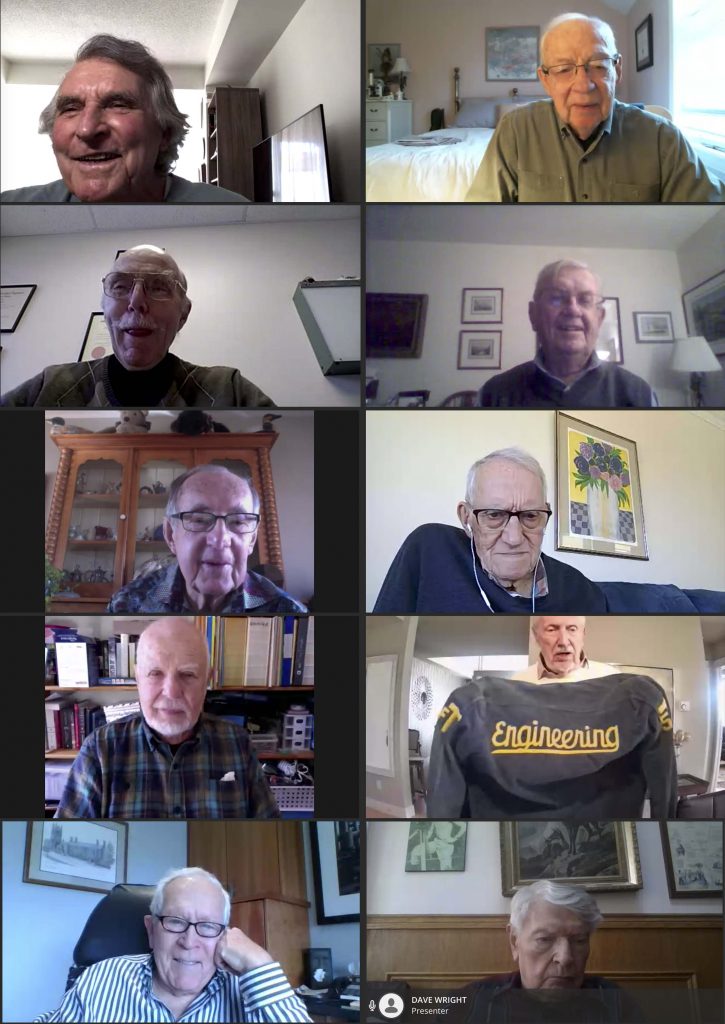
More than 62 years since graduating, U of T’s civil engineering class of 5T8 still enjoy getting together to reminisce. The current worldwide pandemic has foiled their usual Toronto-area lunches at a North York hotel, so they’re making the most of the situation with a video conference reunion.
A dozen of the almost 30 classmates contacted via email were able to show up for the virtual gathering, held the afternoon of Thursday, November 12. The time of day was crucial, as it allowed alumni from coast-to-coast to join in at a reasonable hour. The 1 p.m. ET gathering saw classmates from Vancouver to the Maritimes, as well as from Georgia, GA.
The usual social lunches, held a few times throughout the year, are no longer possible, so CivMin offered to help host an event for them. Spearheaded by Barry Hitchcock, 90, the group of engineers recounted tall tales from Survey Camp, having fun playing in the Lady Godiva Band and success in the early days of Concrete Canoe competitions.
Winston (Win) Pearce proudly displayed his vintage U of T Engineering jacket for those assembled, adding it still fit him well. The appearance of the jacket memorabilia prompted Professor John Timusk to recall he had to hitchhike to Niagara Falls and back every weekend while holding a 1955 summer job in Owen Sound, Ont. Wearing a similar Engineering-branded jacket made him appear respectable enough to pick up on the side of the road.
With camaraderie evident, the jests haven’t diminished over the years either. Leonard (Len) Pitura remarking on his friend’s long hair, grown out over the pandemic, quipped,”Barry, I can see you haven’t been to a barber for a while!”
The group enjoyed the gathering and agreed to participate in another reunion in the new year.
By Phill Snel
If you’re a Civ or Min alumni group hoping to hold an online reunion, please email civ.communications@utoronto.ca to see if we can assist.
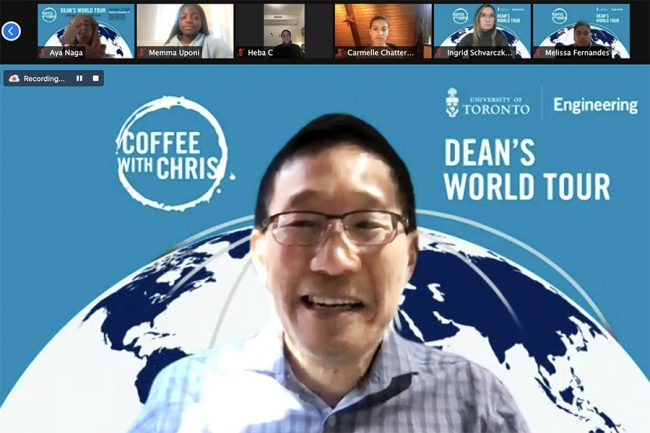
U of T Engineering Dean Christopher Yip took a virtual trip around the world on Thursday, November 12.
Using the digital meeting platform Zoom, Dean Yip facilitated a series of open discussions for undergraduate students, who are currently studying remotely in dozens of locations around the world — from Toronto to Tehran to Taipei — due to public health restrictions put in place to combat the spread of COVID-19.
“We wanted to do this session because we are now more than halfway through the semester, which is the time when the stress level naturally starts to inch up a bit,” said Dean Yip in his opening remarks.
“I want to hear from you about what’s working and what isn’t, but I also want to give you a chance to connect with other students in your time zone who may be going through the same challenges you are.”
More than 100 students registered for the three sessions, each of which was scheduled at times convenient for a certain section of the globe. Session 1 covered Southeast and East Asia, while Session 2 covered Europe, Africa, Central and South Asia, and the Middle East. Session 3 was aimed at students in North, Central and South America.
The Dean was joined by front-line staff including academic advisors, learning strategists and the Faculty’s registrar and Mental Health Programs Officer.
Also joining were more than a dozen alumni, from recent graduates to seasoned professionals. Each shared their own experiences on how students can make the most of their time at Skule™, how to network and prepare for future career opportunities, and offered to connect with those in their regions of the world.
“I was really grateful to get a chance to talk to Faculty, alumni, and students from U of T Engineering because it demonstrated the support and availability of the community from all over the world,” said Carmelle Chatterjee (Year 3 ChemE), who attended remotely from Frankfurt, Germany.
“Especially in these times. it’s nice to get a reminder of what we all have in common and how we can connect, regardless of our background or where we may be situated in the world.”
This event was the first of its kind, but it likely won’t be the last. U of T Engineering has extended its Remote Access Guarantee for the Winter semester.
“I’ve been so gratified and impressed to see how everyone has handled the current situation, using their engineering talent to develop creative solutions to unusual challenges,” said Dean Yip. “Going forward, I think it’s really important to continue to maintain our strong community, form new connections and for me to hear directly from students.”
By Tyler Irving
This story originally published in Engineering News
